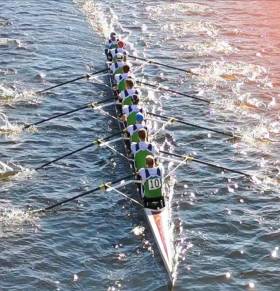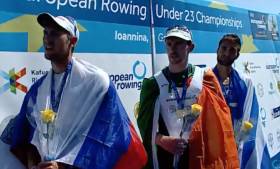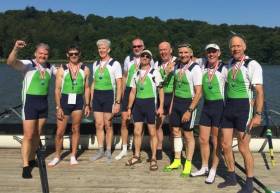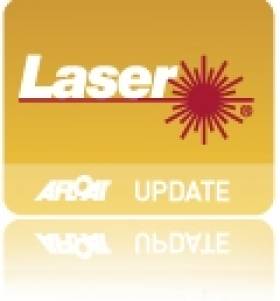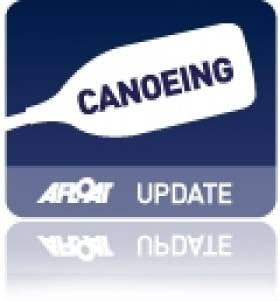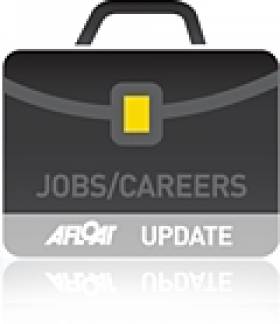Displaying items by tag: Masters
Shandon Man Dorney Third at Head of the Charles in Boston
#Rowing: Jack Dorney (18) finished third in the Head of the Charles Regatta in Boston today. The Shandon man, defending his title in the men’s youth singles, was beaten by the winner, Nicholas Aronow, and second-placed Isaiah Harrison.
In the men’s senior master eights (average age 50 plus), an Irish Masters Boat Club crew made up of rowers from around Ireland took fourth. Ex Nemo won, while the second-placed Upper Yarra crew featured former Australian greats Duncan Free and James Tomkins as the stern pair.
#Rowing: The Afloat Rower of the Month for September is Ronan Byrne. On Sunday, September 1st, the 21-year-old Corkman partnered Philip Doyle to silver in the double sculls at the senior World Championships in Linz-Ottensheim in Austria. He then set off for the European Under-23 Championships in Ioannina in Greece. He won gold there in the single sculls, overhauling imposing Russian sculler Alexander Vyazovkin in the final to win by over a length.
Byrne was the worldrowing.com Rising Star for September.
The month was also a special one for Ireland’s masters rowers. Crews drawn from Irish clubs, often in composites, set a new record of 16 medal wins at the World Masters Championships, held this year at Lake Velence in Hungary. Denis Crowley was a part of many of those wins – he put together an astounding tally of eight medals at this one event.
Monika Dukarska, who qualified the Ireland women’s pair for the Olympic Games at the World Championships, won gold for Killorglin in the single, the double and the coxed quadruple at the Irish Offshore Championships. Patrick Boomer won the men’s single for Loughros Point.
Crowley a Six Shooter at World Masters Regatta
#Rowing: Denis Crowley of Commercial brought his tally of wins to a remarkable six after three days at the World Masters Regatta in Budapest. In just one day, the 57-year-old won in the coxless four and twice in the single sculls – in the C class (43 years or more) and the E class for 55 or more. The decision to form composite crews again paid off for the Irish, with wins in the C eight and the D coxed four, along with Crowley’s haul.
World Masters Regatta, Budapest, (Selected Results, Irish interest, winners)
Friday
Men
Eight
(C – 43 or more): Heat Four: Commercial, Cork, Neptune, Clonmel, Shannon, Galway, Castleconnell (B Crean, B Smyth, R Carroll, O McGrath, G O’Neill, P Fowler, B O’Shaughnessy, K McDonald; cox: M McGlynn) 3:09.75.
Four
(E – 55 or more) Heat Five: Commercial, Neptune, Belfast BC, Galway (D Crowley, G Murphy, C Hunter, A McCallion)
Four, coxed
(D – 50 or more) Heat 3: Galway, Neptune, Castleconnell, Clonmel (G O’Neill, O McGrath, B O’Shaughnessy, T Dunn; cox: M McGlynn) 3:35.89.
Sculling, Single
(C - 43 or more) Heat 19: Commercial (D Crowley) 3:49.92.
(E – 55 or more) Heat 8: Commercial (Crowley)
Irish Masters Eight are Afloat Rowers of Month
#Rowing: The Irish eight which won at the World Masters Regatta at Lake Bagsvaerd, Denmark, have been chosen as the Afloat Rowers of the Month for September. There were a number of good results by Irish crews at the event, which is one of the biggest international events of the year. Among the competitors this year was Denmark legend Eskild Ebbesen. The Irish E eight (55 years or older), was drawn from five clubs (Commercial, Belfast Boat Club, Neptune, Old Collegians and Waterford Boat Club) and outpaced German and British rivals in a field of seven crews. They had also won last year at this level. The crew was: John Hudson, Denis Crowley, Gerry Murphy, Mick Heavey, Colin Dickson, Colin Hunter, Fran O’Toole, Donal Mc Guinness and cox Al Penkert.
Rower of the Month awards: The judging panel is made up of Liam Gorman, rowing correspondent of The Irish Times, and David O'Brien, editor of Afloat magazine. Monthly awards for achievements during the year will appear on afloat.ie and the overall national award will be presented to the person or crew who, in the judges' opinion, achieved the most notable results in, or made the most significant contribution to rowing during 2016. Keep a monthly eye on progress and watch our 2016 champions list grow.
#lasermasters – Defending Champion Thomas Chaix will be back on Dublin Bay to defend his 2014 Irish Laser Masters Championships along with other confirmed entries from Howth, Malahide, Cork and Ballyholme. The local Bay fleet aims to muster a strong contingent too so it's shaping up to be great event, according to organiser Paul Keane.
Racing will able available in standard, radial and 4.7 rigs. Sailors must be over 35 on the first day of the event.
The event is hosted by the Royal Irish Yacht Club (RIYC) on the 31st May and the 1st June.
Live fleet tracking is promised and Saturday's après race BBQ is included in the entry fee for the LogMeIn–sponsored event. More details can be found here.
According to the International Laser class, Masters racing is broken into four age divisions: Apprentice (35-44 years old), Master (45-54 years old), Grand Master (55-64 years old) and Great Grand Master (65+). At the highly competitive but very fun World Championships racing against competitors is only in one age division but elsewhere racing can be an all in affair.
Canoeist Banks Comes Close in Copenhagen
#CanoeMarathon2013: Malcolm Banks of Salmon Leap Canoe Club finished fifth in the K1 50 to 54 class at the Canoe Marathon Masters World Cup in Copenhagen in Denmark today. The Irishman got away with the leading group and was just 28 seconds off a medal at the finish. Banks was a Masters world champion in 2008.
Vacancies at Mainport International Corporation
The Mainport International Corporation has vacancies for the following positions.
Masters for their Seismic Support Vessels working worldwide. The suitable candidate is required to have good ship-handling experience, as the position involves replenishment of seismic vessels at sea, while underway. Simulation training will be given at the National Maritime College of Ireland (NMCI) Ringaskiddy prior to commencement of employment.
In addition there are vacancies for Engineers on board their Seismic Support Vessels. The position is for a tour of duty of two-months on and two- months off. Applicants are asked to email their CV and relevant certificates to [email protected] and [email protected]
For further information in general about the Cork based Mainport Group logon to www.mainport.ie and for the NMCI www.nmci.ie



























